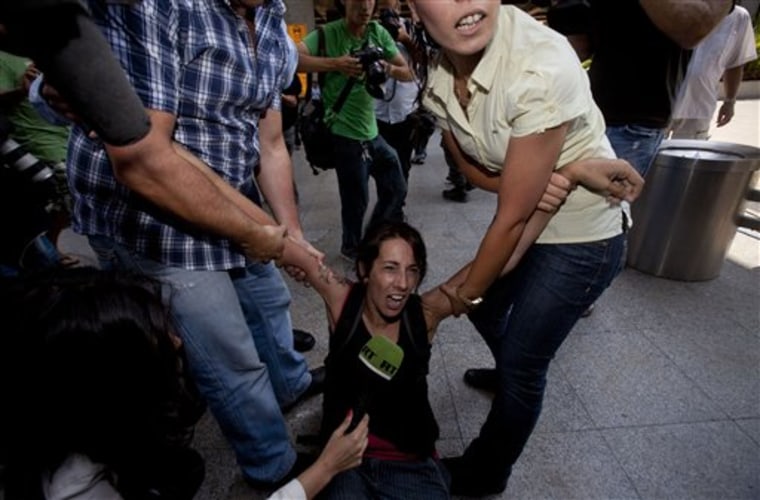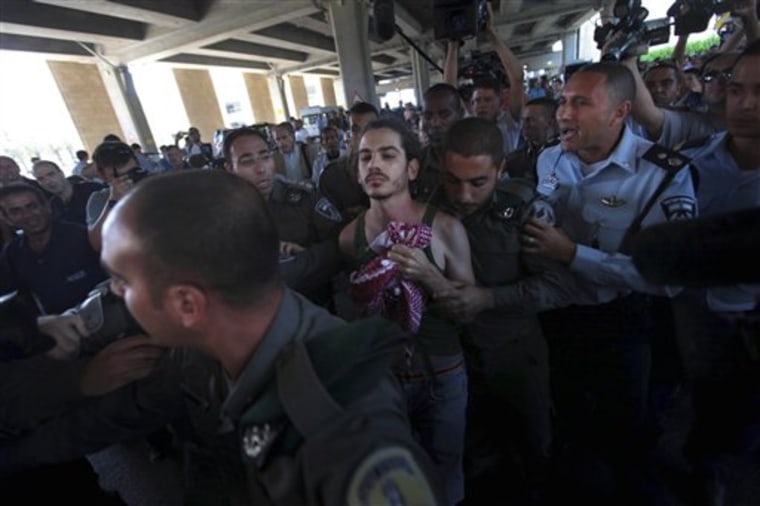Aided by Facebook, Israel on Friday prevented scores of pro-Palestinian activists from boarding Tel Aviv-bound flights in Europe and detained or deported dozens more upon arrival at its main airport, heading off attempts by the foreign protesters to reach the West Bank on a solidarity mission with the Palestinians.
Israel had tracked the activists on social media sites, compiled a blacklist of about 300 names and asked airlines to keep those on the list off flights to Israel. On Friday, some 60 of the activists who managed to land in Tel Aviv were detained for questioning, and by early evening, 27 of them had been deported. At one point, two planes from Geneva and Rome were diverted to a secluded area of the airport upon landing and boarded by security.
Organizers of the "Welcome to Palestine" campaign accused Israel of overreacting to what they said is a peaceful mission to draw attention to life under Israeli occupation, including travel restrictions. Israel controls all access to the West Bank.
"This was never about demonstrations at airports. We are on a fact-finding mission. We want to understand what's going on," said Pippa Bartolotti, a 57-year-old British activist from Wales.
She said she was the only member of a 40-member group on a flight from Britain who managed to enter Israel. "Unfortunately everybody else is in a holding bay and expected to be deported," she said. "There are people from Belgium, France and the U.K."
'Disruptions'
Israel has been jittery about the arrival of foreign activists since a deadly naval raid on an international flotilla that tried to break Israel's blockade of the Gaza Strip last year. The incident, in which nine Turkish activists died in clashes with naval commandos, drew heavy international criticism and forced Israel to ease the blockade.
Israel took a series of measures to prevent clashes this time, most notably by barring protesters from the country altogether. Hundreds of police were also deployed at the already heavily fortified Ben-Gurion International Airport.

Authorities forwarded a blacklist to foreign airlines, preventing scores from boarding their flights.
Yigal Palmor, a spokesman for Israel's Foreign Ministry, said the list was compiled by following organizers' preparations on social networks and websites. In all, about 300 people were identified as planning to create "provocations" upon arrival, he said.
"These people announced on their Internet sites that they planned to come here and cause disruptions, and told their friends. We were able to contact other foreign ministries and simply give them links," Palmor said. Barring entrance in such cases is "accepted practice in any country," he added.
Recent anti-Israel protests, including deadly clashes along the frontiers with Lebanon and Syria as well as another attempted flotilla last week, were organized on Facebook and other sites. Defense officials say Israel now closely follows organizer activities online.
Israeli police spokesman Micky Rosenfeld said some 200 people were prevented from boarding their flights at airports throughout Europe. "The companies did not allow them on the airplanes because we told them clearly they wouldn't be able to enter Israel," Rosenfeld said.
Organizers said only a small number, perhaps fewer than 10, out of an expected 600 activists managed to enter Israel on their way to the West Bank, though more arrivals were expected Friday and Saturday.
Anna De Palma, 44, a Portuguese citizen, said she passed border controls without problems, apparently because she didn't identify herself as an activist. "I said I was coming to visit. That was it," she said. "I am not a conspicuous person and we don't have to be conspicuous about it."
"I am going to participate in the mission on the call of civilian Palestinian society. To participate in specific demonstrations. To help the Palestinian people. To make a stand," she said.
'Provocative, blackmailing and illegal'
One of the organizers, French activist Olivia Zemor, said her group planned only nonviolent activities. "Welcome to Palestine" released a statement Friday calling the moves to prevent activists from reaching Israel "provocative, blackmailing and illegal."
At Charles de Gaulle Airport in Paris, several would-be protesters were turned away from check-in counters, and protesters subsequently gathered in the terminal, shouting "Boycott Israel," as French police stood by.
Cynthia Beatt, a British citizen living in Germany, told The Associated Press that she had been barred from boarding a Lufthansa plane Friday morning in Berlin. "Lufthansa called me last night and said I would not be allowed to board their plane because Israel denied me entry," Beatt said.
In Geneva, dozens of activists were barred from boarding an EasyJet flight to Tel Aviv. Aline Yazgi, a spokeswoman for Switzerland's second biggest airport, said the passengers tried to pass through security without a boarding card and were turned back, closing part of the airport for about 40 minutes as a result.
An EasyJet spokesman in Geneva, Adrian Fuhrer, said 40 people were prevented from boarding the plane at the request of Israeli authorities. "It was compulsory for EasyJet not to let these people on board," Fuhrer said.
Israel has not publicized its criteria for denying entry, but has said peaceful visitors will not be deported. The large numbers of people who were blocked indicated that Israel was giving few activists the benefit of the doubt.
The activists have placed Israel in an awkward position. Authorities are determined to keep out people they consider hostile agitators, but critics in Israel have said the government's high-profile reaction has only drawn attention to the activists' attempt to gain publicity.
Visitors can reach the West Bank only through Israeli-controlled crossings, either through international airports or the land border with Jordan. Citing security concerns, Israel bars most Palestinians from entering Israel or using its airport, meaning they must travel to neighboring Jordan to fly out.
At any given time, hundreds of foreigners, including activists and aid workers, are in the West Bank.
Travel restrictions in the Gaza Strip, ruled by the militant Hamas group, are even more rigorous. Israel allows few people to cross its border with Gaza, and most Gazans can travel abroad only by crossing into Egypt through their shared border.
___
Associated Press writers Angela Charlton in Paris, Kirsten Grieshaber in Berlin, and Frank Jordans in London contributed to this report.
